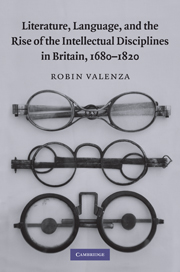Book contents
- Frontmatter
- Contents
- List of Figures
- Acknowledgments
- 1 The Economies of Knowledge
- 2 The Learned and Conversable Worlds
- 3 Physics and its Audiences
- 4 Philosophy's Place Between Science and Literature
- 5 Poetry Among the Intellectual Disciplines
- Coda: Common Sense and Common Language
- Notes
- Works Cited
- Index
4 - Philosophy's Place Between Science and Literature
Published online by Cambridge University Press: 14 December 2009
- Frontmatter
- Contents
- List of Figures
- Acknowledgments
- 1 The Economies of Knowledge
- 2 The Learned and Conversable Worlds
- 3 Physics and its Audiences
- 4 Philosophy's Place Between Science and Literature
- 5 Poetry Among the Intellectual Disciplines
- Coda: Common Sense and Common Language
- Notes
- Works Cited
- Index
Summary
In his History of England, David Hume devotes a short eulogistic paragraph to Isaac Newton:
In Newton this island may boast of having produced the greatest and rarest genius that ever arose for the ornament and instruction of the species … From modesty, ignorant of his superiority above the rest of mankind; and thence, less careful to accommodate his reasonings to common apprehensions: More anxious to merit than acquire fame: He was from these causes long unknown to the world; but his reputation at last broke out with a lustre, which scarcely any writer, during his own lifetime, had ever before attained.
Though the two men never met, the Newton that Hume portrays resembles no one so much as Hume himself, or at least the way he would later represent himself in his deathbed autobiography, My Own Life. In it, Hume pictures himself as a man who, like Newton, refuses to bow to “common apprehensions” in pursuing his work, waiting patiently for his fame to catch up with his merit. Hume even describes himself using the same metaphor of the delayed, feverish reputation he had used to portray Newton: “I see many symptoms of my literary reputation's breaking out at last with additional lustre.” Despite the correspondence in Hume's descriptions, however, neither their professional lives nor the reception histories of their books followed such parallel tracks. Hume ultimately became known for pandering to popular taste, deliberately forsaking studies too difficult for a general reader to understand.
- Type
- Chapter
- Information
- Literature, Language, and the Rise of the Intellectual Disciplines in Britain, 1680–1820 , pp. 92 - 138Publisher: Cambridge University PressPrint publication year: 2009



